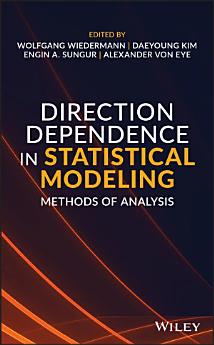Direction Dependence in Statistical Modeling: Methods of Analysis
આ ઇ-પુસ્તક વિશે
Direction Dependence in Statistical Modeling: Methods of Analysis incorporates the latest research for the statistical analysis of hypotheses that are compatible with the causal direction of dependence of variable relations. Having particular application in the fields of neuroscience, clinical psychology, developmental psychology, educational psychology, and epidemiology, direction dependence methods have attracted growing attention due to their potential to help decide which of two competing statistical models is more likely to reflect the correct causal flow.
The book covers several topics in-depth, including:
- A demonstration of the importance of methods for the analysis of direction dependence hypotheses
- A presentation of the development of methods for direction dependence analysis together with recent novel, unpublished software implementations
- A review of methods of direction dependence following the copula-based tradition of Sungur and Kim
- A presentation of extensions of direction dependence methods to the domain of categorical data
- An overview of algorithms for causal structure learning
The book's fourteen chapters include a discussion of the use of custom dialogs and macros in SPSS to make direction dependence analysis accessible to empirical researchers.
લેખક વિશે
WOLFGANG WIEDERMANN is Associate Professor at the University of Missouri-Columbia. He received his Ph.D. in Quantitative Psychology from the University of Klagenfurt, Austria. His primary research interests include the development of methods for causal inference, methods to determine the causal direction of dependence in observational data, and methods for person-oriented research settings. He has edited books on advances in statistical methods for causal inference (with von Eye, Wiley) and new developments in statistical methods for dependent data analysis in the social and behavioral sciences (with Stemmler and von Eye).
DAEYOUNG KIM is Associate Professor of Mathematics and Statistics at the University of Massachusetts, Amherst. He received his Ph.D. from the Pennsylvania State University in Statistics. His original research interests were in likelihood inference in finite mixture modelling including empirical identifiability and multimodality, development of geometric and computational methods to delineate multidimensional inference functions, and likelihood inference in incompletely observed categorical data, followed by a focus on the analysis of asymmetric association in multivariate data using (sub)copula regression.
ENGIN A. SUNGUR has a B.A. in City and Regional Planning (Middle East Technical University, METU, Turkey), M.S. in Applied Statistics, METU, M.S. in Statistics (Carnegie-Mellon University, CMU) and Ph.D. in Statistics (CMU). He taught at Carnegie-Mellon University, University of Pittsburg, Middle East Technical University, and University of Iowa. Currently, he is a Morse-Alumni distinguished professor of statistics at University of Minnesota Morris. He is teaching statistics for more than 38 years, 29 years of which is at the University of Minnesota Morris. His research areas are dependence modeling with emphasis on directional dependence, modern multivariate statistics, extreme value theory, and statistical education.
ALEXANDER VON EYE is Professor Emeritus of Psychology at Michigan State University (MSU). He received his Ph.D. in Psychology from the University of Trier, Germany. He received his accreditation as Professional Statistician from the American Statistical Association (PSTATTM). His research focuses (1) on the development and testing of statistical methods for the analysis of categorical and longitudinal data, and for the analysis of direction dependence hypotheses. In addition (2), he is member of a research team at MSU (with Bogat, Levendosky, and Lonstein) that investigates the effects of violence on women and their newborn children. His third area of interest (3) concerns theoretical developments and applied analysis of person-orientation in empirical research.





